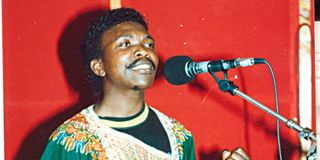President Uhuru Kenyatta saved me from homelessness, says Rafiki Pesa artist

What you need to know:
- About 15 years ago, I was homeless after spending so much on a project that failed terribly.
- I did not even have food to eat. My wife was out of the country and I was scared to ask for her help.
- I survived on mandazi and water for about eight months.
- One day retired President Uhuru Kenyatta sent someone to come and look for me to perform on Mashujaa Day.
At the age of 54, Shari Martin stands as a beacon of talent and determination in the Kenyan music industry, notably recognised for his timeless hit, Rafiki Pesa, released in 1998. Hailing from one of the most marginalised communities in Kenya, Shari Martin takes us on an intimate exploration of his musical journey, which spans three decades.
He also shares a compelling narrative of how retired President Uhuru Kenyatta played a key role in rescuing him from homelessness in 2014. A skilled chef by profession, Shari Martin's decision to transition from a successful career in food production to fully devote himself to music unveils a remarkable story of passion, sacrifice, and the transformative power of music.
1. With three decades of experience in the music industry, how have you managed to stay relevant and maintain your brand over the years?
It is by God's grace, but I also think it is because I made evergreen songs. I always record my music from January to June. That has been my mantra. Then in August, I start promoting and distributing the songs. A few years back, we used to sell cassettes and DVDs, but that time is gone. We now sell our music on YouTube and I transitioned to that, and I am paid well.
Most musicians expect fast results when they join the industry, but that never happens. You have to give yourself time and look at what is trending, and how you can keep improving. It is very easy to promote a good song.
2. What inspired the creation of your renowned song, Rafiki Pesa?
I released it in 1998. I was very young and working as a chef then. I worked for about 35 years in the hotel industry. I used to see nuns coming with priests and staying there. They would spend like two months there and then they would say they had been to the Vatican. I felt that was dangerous. I saw the same thing happening where instead of men coming with their families, they would come with their girlfriends. Cases of HIV/Aids were also very high and I would interact with so many sick people. That is how I got the inspiration to write that song. I wanted to teach men to spend more time with their families. I did not do much to promote that song, people just liked it and it ended up becoming popular both in Kenya and across borders.
3. What guidance would you offer to the youth regarding how they should utilise their time?
As a young man, look for money and then marry a young girl. Don't marry your age mate. That is why there are so many broken marriages. The youth should sit and focus on how they can make money. Make real money and live a real life. Ujana ni moshi kweli, and this idea of faking it until you make it will never work.
Additionally, musicians should stop writing songs that are solely tailored for the club, because such music is not sustainable. It stays on trend for only a short time.
4. Which was your most challenging period in the local music industry, and how did you overcome the challenge?
About 15 years ago, I was homeless after spending so much on a project that failed terribly. I did not even have food to eat. My wife was out of the country and I was scared to ask for her help. I survived on mandazi and water for about eight months.
One day retired President Uhuru Kenyatta sent someone to come and look for me to perform on Mashujaa Day. He was told about my predicament, and that was my turning point. I went to Statehouse for practise sessions, and he paid us Sh800,000 which helped me get back on my feet.
President Uhuru is a good man who loves people and is very social. He kept his word and today, I am doing well thanks to him.
5. Balancing a career in both the hotel and music industries can be demanding. How do you juggle these distinct professional paths?
I studied food production in college and worked in various five-star hotels around Kenya. I bought my musical instruments with the money I got from my hustles back then.
When you are working, make sure you invest because employment is not for life. Save and plan your future. And, never move from your current job unless you have somewhere to go.
Currently, I spend some time in hotels but not cooking. I quit the hotel industry because of health issues. Initially, I used to cook and also perform at hotels, but it was too much work.





